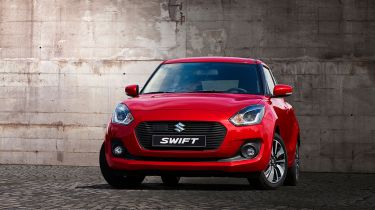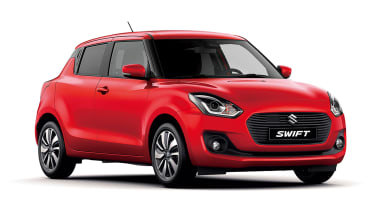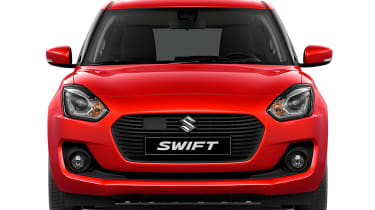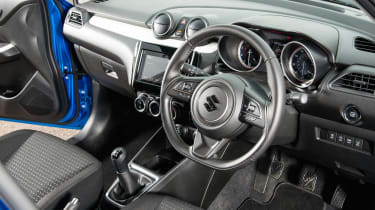Fun-to-drive new Suzuki Swift will start from £11k
Latest version of Suzuki supermini on sale in June
If you’re in the market for a fun little hatchback, another choice has come your way. The new Suzuki Swift will be priced from £10,999; at least £1,600 cheaper than the most basic Mazda2 or Ford Fiesta.
It bears a strong resemblance to the current car, but with sportier looks. Although the Swift shares its underpinnings with the larger Suzuki Baleno, it promises a greater emphasis on driver appeal.
Suzuki’s UK sales and marketing director Dale Wyatt said: “lightness and a fun drive will be the focus. Having the practical Baleno allows us to look at the dynamics of the Swift.”
Because it weighs just 890kg, the entry-level SZ3 model comes with a 1.2-litre petrol engine producing 90bhp and a very respectable 65.7mpg. A 1.0-litre turbocharged petrol engine is also available with either an automatic or a manual gearbox. Go for that and you’ll have a nippy 109bhp at your disposal.
The SZ3 is the cheapest model, but that doesn’t mean you have to make do with a sparse equipment list. LED daytime running lights, air-conditioning and DAB digital radio are all standard, as are 15-inch alloy wheels, rear privacy glass and Bluetooth connectivity. It’s worth mentioning that you can no longer buy a new Swift for under £10,000, like you could with the previous generation.
The mid-range SZ-T starts at £12,999 and adds a rear-view camera, front foglights and 16-inch wheels. There are two ‘mild hybrid’ engines available with the top-spec SZ5. That spec level includes automatic air-conditioning, sat nav, keyless entry and autonomous emergency braking.
Specifying an automatic gearbox (only available on the 1.0-litre petrol SZ5) is the most expensive way into Swift ownership, costing £15,849, while you can get a four-wheel-drive mild hybrid (with a manual gearbox) for £15,499.
Technology levels have also been increased – top-spec models now have autonomous emergency braking and active cruise control fitted as standard.
The new Suzuki Swift is on sale now – read our review here.
2017 Suzuki Swift design
The new Suzuki Swift may look similar to before, but is actually all new and 15mm lower, 40mm wider and 10mm shorter than the previous model. This lends it a lower, sleeker look, while retaining its familiar identity.
Although it shares a platform with the Baleno, the Swift will be allowed its own fun-loving persona – enthusiastic drivers often praise the outgoing Swift for its enjoyable handling.
The new platform also contributes to a 120kg weight saving over the current car, while its increased stiffness should improve crash safety. Despite being 10mm shorter than the previous model, a 20mm increase in wheelbase (the distance between front and rear axles) is said to have improved interior space. Boot space is also increased to 254 litres, which is 54 litres more than before.
While the overall look may be familiar, there are many new details that catch the eye. Blacked-out pillars all-round lend a ‘floating roof’ effect, while rear door handles are concealed in the darkened area of the C-pillar, for a coupe-like appearance.
The pronounced character line that runs along the lower part of the doors is retained, but now runs into the rear wheelarches. The new car also has pronounced shoulders, with sharp edges running from the headlights and fading into the front door, before emerging on the back door to run into the rear lights.
At the front, a six-sided sports-car-style grille is more distinctive than that of the old car, while a lower grille wraps under and incorporates fog or daytime running lights. Higher trim levels will be identified by LED signature illumination in the headlamps and rear lights.
Inside, the new Suzuki Swift makes the most of its enlarged exterior dimensions, with more space for those in the back, including 23mm more headroom – despite the car being lower than before. The new Swift’s increased width allows the front seats to be spaced wider apart, increasing comfort for both front occupants.
2017 Suzuki Swift engines and features
The entry-level SZ3 model will use Suzuki’s 88bhp 1.2-litre Dualjet petrol engine, with a manual gearbox. It’s claimed to return 65.7mpg, with CO2 emissions of 98g/km. Features includes air-conditioning, a leather steering wheel, DAB radio with Bluetooth phone connectivity, electric front windows and darkened privacy glass in the rear doors.
Moving up to the SZ-T model introduces the efficient 109bhp 1.0-litre Boosterjet turbocharged petrol engine, which promises 61.4mpg and CO2 emissions of 104g/km with the manual gearbox. SZ-T buyers also get an infotainment system with 3D sat nav, MirrorLink, Android Auto and Apple CarPlay connectivity, as well as a rear-view camera. Also fitted are 16-inch alloy wheels, keyless entry and a collision detection system, plus electric rear windows.
The range-topping Suzuki Swift SZ5 will feature braking assistance, autonomous emergency braking, lane-departure warning and adaptive cruise control. A 4.2-inch colour dashboard display can also show the driver a range of information, including engine output and cornering g-force.
The Boosterjet engine will also be available as part of an SHVS ‘mild hybrid’ system, where the starter motor can also act as a generator, allowing the battery to be charged by regenerative braking. This is claimed to bring CO2 emissions down to 97g/km, while only adding 6kg to the weight of the car.
A four-wheel-drive option will be available on the 1.2-litre SZ5, using Suzuki’s ALLGRIP system, which automatically send power to the rear wheels when necessary.
2017 Suzuki Swift: price and on-sale date
Already on sale in Japan, the Swift will be available in the UK from 1 June. As mentioned above, it’ll start from £10,999, rising to £15,849 for the most expensive version.
Recommended

Suzuki’s new 10-year warranty is free – here’s how to get it
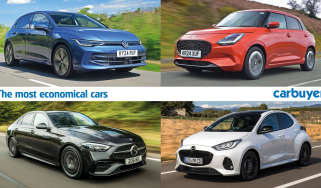
The most economical cars 2025 – petrol, diesel, hybrid and plug-in hybrid
Most Popular
Tips & advice

Car dashboard warning lights: what does each symbol mean?

Electric car charging stations: public networks, charger types, apps and maps

